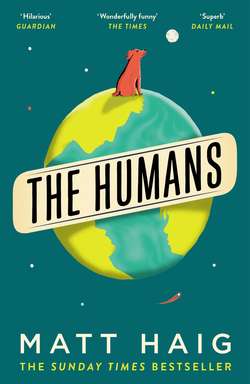Читать книгу The Humans - Matt Haig - Страница 24
На сайте Литреса книга снята с продажи.
4 Campion Row
ОглавлениеIt was a warm room.
There was a window, but the curtains were drawn. They were thin enough for electromagnetic radiation from the only sun to filter through and I could see everything clear enough. The walls were painted sky-blue, and there was an incandescent ‘lightbulb’ hanging down from the ceiling with a cylindrical shade made of paper. I was lying in bed. It was a large, square bed, made for two people. I had been lying asleep in this same bed for over three hours, and now I was awake.
It was Professor Andrew Martin’s bed, on the second floor of his house. His house was at 4 Campion Row. It was large, compared to the exteriors of other houses I had seen. Inside, all the walls were white. Downstairs, in the hallway and the kitchen, the floor was made of limestone, which was made of calcite, and so provided something familiar for me to look at. The kitchen, where I had gone to drink some water, was especially warm owing to the presence of something called an oven. This particular type of oven was made of iron and powered by gas, with two continually hot discs on its top surface. It was called an AGA. It was cream-coloured. There were lots of doors in the kitchen and also here in the bedroom. Oven doors and cupboard doors and wardrobe doors. Whole worlds shut away.
The bedroom had a beige carpet, made of wool. Animal hair. There was a poster on the wall which had a picture of two human heads, one male and one female, very close together. It had the words Roman Holiday on it. Other words, too. Words like ‘Gregory Peck’ and ‘Audrey Hepburn’ and ‘Paramount Pictures’.
There was a photograph on top of a wooden, cuboid piece of furniture. A photograph is basically a two-dimensional nonmoving holograph catering only to the sense of sight. This photograph was inside a rectangle of steel. A photograph of Andrew and Isobel. They were younger, their skins more radiant and unwithered. Isobel looked happy, because she was smiling and a smile is a signifier of human happiness. In the photograph Andrew and Isobel were standing on grass. She was wearing a white dress. It seemed to be the dress to wear if you wanted to be happy.
There was another photo. They were standing somewhere hot. Neither of them had dresses on. They were among giant, crumbling stone columns under a perfectly blue sky. An important building from a former human civilisation. (On Earth, incidentally, civilisation is the result of a group of humans coming together and suppressing their instincts.) The civilisation, I guessed, was one that must have been neglected or destroyed. They were smiling, but this was a different kind of smile and one which was confined to their mouths and not their eyes. They looked uncomfortable, though I attributed this to the heat on their thin skin. Then there was a later photograph, taken indoors somewhere. They had a child with them. Young. Male. He had hair as dark as his mother, maybe darker, with paler skin. He was wearing an item of clothing which said ‘Cowboy’.
Isobel was there in the room a lot of the time, either sleeping beside me or standing nearby, watching. Mostly, I tried not to look at her.
I didn’t want to connect to her in any way. It would not serve my mission well if any kind of sympathy, or even empathy towards her were to form. Admittedly, this was unlikely. Her very otherness troubled me. She was so alien. But the universe was unlikely before it happened and it had almost indisputably happened.
Though I did brave her eyes for one question.
‘When did you last see me? I mean, before. Yesterday?’
‘At breakfast. And then you were at work. You came home at eleven. In bed by half past.’
‘Did I say anything to you? Did I tell you anything?’
‘You said my name, but I pretended to be sleeping. And that was it. Until I woke up, and you were gone.’
I smiled. Relieved, I suppose, but back then I didn’t quite understand why.
